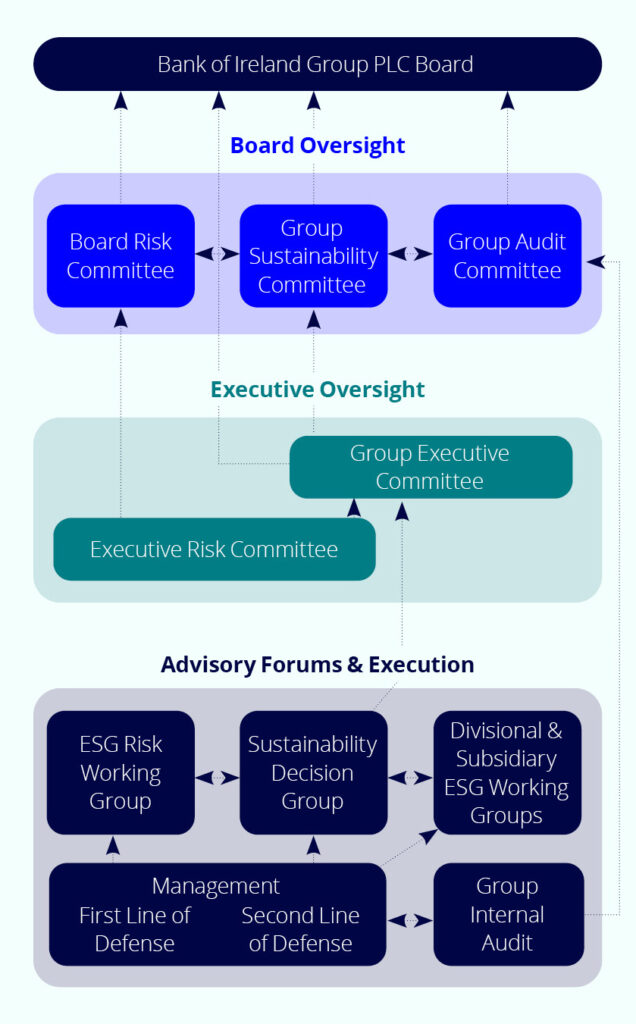Governance
Bank of Ireland is committed to high standards of corporate governance

- Board Oversight
- Executive Oversight
- Advisory Forums and Executive
- Incorporating Sustainability into performance management
Sustainability at Board Level
The Board is collectively responsible for the long-term sustainable success of the Group and for ensuring there is a strong corporate structure in place, which is aligned with the Group’s strategy and purpose. It provides leadership of the Group, setting strategic aims, within the boundaries of the Group’s risk appetite and a framework of prudent and effective controls. Responsibilities in respect of Sustainability and ESG are delegated to the Group Sustainability Committee (GSC), which, jointly with Board Risk Committee (BRC), is also responsible for ensuring ESG risks have been integrated into the Group Risk Management Framework.
Group Sustainability Committee (GSC)
On behalf of the Board, the GSC, oversees the development and implementation of the Group’s Sustainability strategy and, together with the BRC, oversees related risks, including monitoring the Climate Risk Implementation Plan. As part of that role, the GSC oversees progress against ESG targets, review of ESG-related commitments and the publication of the Sustainability Report.
Board Risk Committee (BRC)
On behalf of the Board, the BRC is responsible, jointly with the GSC, for inter alia ensuring that ESG risks are integrated into the Risk Management Framework.
Group Audit Committee (GAC)
On behalf of the Board, the GAC is responsible for inter alia monitoring the quality and integrity of the financial statements including sustainability disclosures. The level of GAC involvement in sustainability related matters is intended to increase over the course of 2024, given enhanced disclosures requirement under CSRD.
Group Executive Committee (GEC)
The most senior executive committee in the Group, the GEC, acts in an advisory capacity to the CEO and assists the CEO in the management and leadership of the Group on a day-to-day basis. The GEC has overarching responsibility for delivery and operationalisation of the Group’s Sustainability Strategy, with specific executive responsibility for sustainability (including climate change) delegated to the Chief Sustainability and Investor Relations Officer (CSIRO), who reports to the Group Chief Financial Officer (CFO). Members of the GEC include the CFO, Divisional CEO’s and the Chief Risk Officer (CRO).
Executive Risk Committee (ERC)
The ERC supports both the GEC and the BRC, in overseeing the material risks of the Group, taking a holistic approach to overseeing the effective management of risk, including climate and environmental risks.
Sustainability Decision Group (SDG)
The SDG brings together senior business and functional management across the Group to enable a coordinated approach to sustainability objectives across the 3 pillars and to provide a discussion and decision-making forum to deliver on the Group’s sustainability agenda. The SDG is chaired by the CSIRO and regularly updates the GEC on progress against key initiatives.
Divisional and Subsidiary ESG Working Groups
All materially impacted business divisions and businesses have in place dedicated ESG leads and ESG working groups to ensure ESG strategy and operational aspects are integrated into the Group’s business model.
ESG Risk Working Group
The ESG Risk Management Framework sets out the approach to the management of ESG risk factors in the Group. Coordinated by Group Risk, the ESG risk working group brings together Second Line of Defence (2LOD) risk management from across the principal risk types with representation from the First line of Defence (1LOD Sustainability team) to ensure there is coordinated, cohesive and challenging approach to the management of ESG risks (including climate-related and wider ESG risks) within the Group.
Linking remuneration to targets and incorporating sustainability into performance management
In November 2022, the Irish Government announced that a number of crisis-era restrictions related to remuneration were being lifted in respect of the Group. These included removal of the blanket prohibition on variable pay and the introduction of a variable pay cap of €20,000.
As a result of these changes the Group has implemented a regulatory compliant Group Profit Share scheme for all colleagues in all jurisdictions. This has enabled the Group to improve the links between remuneration, personal performance, delivery for customers and the achievement of our long term strategic and commercial goals.
With ‘Sustainable Company’ now a core strategic pillars, ESG is mainstreamed into our performance management system. This puts it on every colleague’s ‘to do’ list. The appropriateness of the final profit share is assessed against a mix of financial and nonfinancial criteria, including profit and related metrics, affordability, customer, and ESG, with the pool as a whole subject to risk adjustment. The Bank currently does not have an Employee Stock Option Plan and did not operate a Stock Incentive Plan in 2023.
Employee representative bodies
We respect our colleagues’ right to freedom of association and we engage with employee representatives bodies, trade unions and partners council, as recognised by the Bank, with c.80% of our colleagues covered by collective bargaining. We frequently consult with employee representatives to provide updates and share information on any relevant matters.